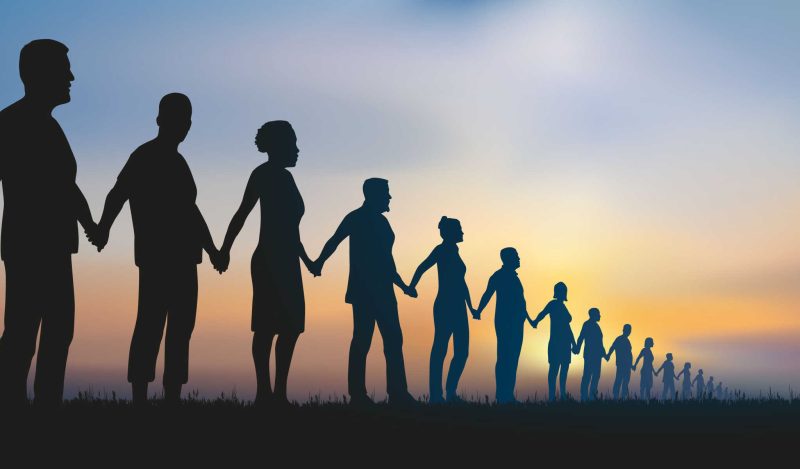One of the most noticeable features of the lockdown era was the transformation of the human rights lobby – whose members are never normally timid when expressing their opinions on government policy – into a conspicuously non-barking dog.
From March 2020, human rights activists and advocates became notable only in their absence as the most basic freedoms were essentially set to one side by government decree. Human rights are still, in the popular lexicon, understood to have the purpose of protecting the liberty of the individual against the overweening state. Why, then, did the global human rights constituency – that conglomerate of lawyers, academics, campaigners, activists, experts, and bureaucrats – so signally fail to pay even lip service to that basic purpose?
Answering that question would take a book. It’s certainly something that I intend to dissect at length, here and elsewhere, as the roots of the human rights movement’s capture by the state-friendly managerial left run very deep. A clue, however, lies in the responses of the various National Human Rights Institutions (NHRIs) to the lockdown phenomenon.
NHRIs, essentially human rights ombudsmen, are a cornerstone of the UN’s human rights system. The idea is that these bodies serve as counterweights to official government policy, acting as a voice for human rights concerns that might be overlooked, and helping the UN system itself implement and monitor compliance with human rights law. They are present in most Western countries (the USA, in keeping with its general scepticism towards international human rights law, and probably to its credit for reasons we shall come to, does not have one) and can usually be relied upon to parrot the received wisdom of the chattering classes on the issues of the day.
NHRIs are accredited by the UN itself and often liaise with each other through the Global Alliance of NHRIS (GANHRI) as a ‘network.’ Handily for interested observers, this results in the public sharing of ‘best practices’ (I use the term advisedly) on Covid-19, including a table of NHRI responses to lockdowns compiled in the early summer of 2020.
It makes for interesting reading. The word ‘liberty’ appears within the 37-page document precisely 8 times, with 7 of those instances (in the responses of the NHRIs of Mongolia, Azerbaijan, Cyprus, France, Luxembourg, Montenegro, and Ukraine) using it in the context of requiring the state to do more to protect ‘vulnerable people…such as persons in places of deprivation of liberty’ – i.e. prisons. The phrase ‘right to liberty’ appears once (in attenuated form) in the document, with the only NHRI which appears to have expressed concern about ‘unwarranted deprivation of the rights to personal security and liberty,’ albeit just in reference to the actions of the police, being Zimbabwe’s ZHRC (although the South African Human Rights Commission also described itself as being ‘disturbed’ by the use of force by police).
The phrase ‘freedom of association,’ meanwhile, does not appear in the document at all, and nor does ‘freedom of conscience.’ ‘Freedom of expression’ does appear – twice – but in ambiguous contexts (the National Human Rights Commission of Nepal apparently ‘provided suggestions’ to its government concerning the matter, and the Norwegian NHRI participated in a panel discussion on ‘fake news, misinformation and freedom of expression’ at a conference). In other words, the collective weight of global NHRIs appears to have had basically nothing to say about the impact of lockdowns and other restrictions on the traditional core of liberal civil rights whatsoever.
On the other hand, there are certain words and phrases that appear again and again. ‘Vulnerable’ appears 27 times, and we see repeatedly an insistence that ‘special protection’ be afforded to ‘vulnerable people’ or ‘vulnerable groups’ – the elderly, people with disabilities, migrants, prisoners, the homeless, children, and so on. ‘Equality’ (or ‘inequality’) appears around 10 times substantively (the word is also just in the title of some NHRIs), generally accompanied by concern about how Covid-19 will amplify ‘inequality’ (see e.g. Canada) or an insistence that ‘equality principles’ should inform how lockdowns are implemented (e.g. Ireland). Poverty is mentioned 12 times; ‘disability’ or ‘disabled’ 32 times; ‘women’ 11 times. The paradigm response in this regard would appear to be that of the Canadian Human Rights Commission, which reads as follows:
The Commission has issued several statements urging the Canadian government and CSOs to continue to defend human rights. People living in poverty, women and children fleeing domestic violence, people living in shelters, on the street or at risk of homelessness, people with disabilities or those with health conditions, people with mental health issues, older people living alone or in institutions, and people in correctional institutions must not be forgotten or ignored.
The overall picture which emerges, that is, is one in which the world’s NHRIs were ‘intensely relaxed’ about the basic idea behind lockdowns and other restrictions on civil liberties, and really only had an interest in finessing the application of the measures in question.
(Indeed, in some instances, NHRIs seem to have functioned more like cheerleaders than critics, as when Belgium’s NHRI ‘welcom[ed] the policy to combat the pandemic,’ Luxembourg’s NHRI ‘welcome[d] the commitment made by the government’ to respond to the ‘health and economic emergency,’ Albania’s human rights ombudsman ‘welcomed measures to restrict the circulation of citizens,’ and the Netherlands’ NHRI ‘welcome[d] the strict measures [!] taken by the government.’ The document is also peppered throughout by references to statements from NHRIs encouraging the citizenry to comply with government edict, as when the Serbian ombudsman ‘urged all citizens…to abide by the measures of the government,’ the Northern Irish NHRI ‘issued a statement stressing the importance for everyone to follow the advice of the government,’ the Danish Institute for Human Rights ‘encourage[d] everyone to act in accordance with regulations and guidelines from local authorities,’ and the Bosnian ombudsman urged citizens to ‘strictly adhere’ to government instructions. Some NHRIs, such as those of Bolivia and Bangladesh, even put on online courses and advertising campaigns encouraging people to stay at home.)
To be fair, some NHRIs – for example those in Spain, Lithuania, Ireland and Denmark – apparently made (admittedly anodyne) statements to the effect that restrictions on rights during emergencies must be proportionate and only imposed in the short term. But the preponderence of all of the accumulated responses is pretty clear: lockdowns are fine, and are indeed even laudable, as long as there are no discriminatory effects and so long as vulnerable groups – people with disabilities, prisoners, minority populations, the old, etc. – are protected and do not suffer disproportionately.
What this picture shows us then, in the end, is that the staff at NHRIs – certainly in the developed world – have very little innate suspicion of the state, and actually seem to rather like it and desire it to be bigger. In this regard, the document reads like a tick-box list of the things which the modern day managerial left wants the state to do more of, and to expand accordingly: end discrimination and bring about equality of outcomes between different groups; protect the ‘vulnerable’ broadly understood; and redistribute resources.
It is hard to escape the conclusion, in other words, that NHRI staff members, who are generally university graduates (usually at postgraduate level) and therefore members of the new elite, and who therefore tend to swim in the same waters as the other members of that class, have simply imbibed most of its values. They welcome the expansion of state bureaucracy per se (because they and their friends and family members tend to be reliant upon it), and especially like it when it is pursuing projects aligned with their own values – equality, paternalism, redistribution.
They have little interest in traditional liberal values such as freedom of expression, freedom of association, and freedom of conscience, and in fact are often implicitly contemptuous of those values and think them to be dangerous. And they are fairly comfortable with the idea of the authorities bossing people around so long as it is for their own (purported) benefit. They, in other words, see themselves as being something like Plato’s class of ‘guardians,’ who possess the wisdom to coordinate society as they see fit.
Such people have no particular animus against authoritarianism in general, as long as it is authoritarianism of the ‘right kind.’ So why would they have spoken out particularly vociferously against lockdowns, or called for governments to be restrained? The answer is simple: they wouldn’t – so they didn’t.
This leads us, of course, to a much wider question, which is what the point of NHRIs is in the first place, if all they are going to be doing is reinforcing and perhaps tinkering around the edges of what de Jouvenel once called ‘the greatest phenomenon of modern times’ – i.e., the expansion of the State in order to achieve a vision of ‘well-being?’ The question, I think, rather answers itself. If you were a State, why would you see the value in creating such an institution?
Reprinted from the author’s Substack
Join the conversation:


Published under a Creative Commons Attribution 4.0 International License
For reprints, please set the canonical link back to the original Brownstone Institute Article and Author.









